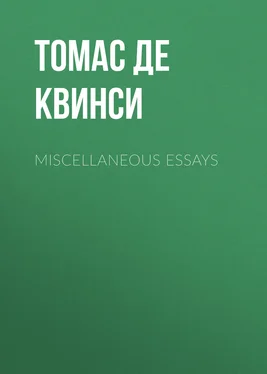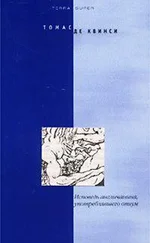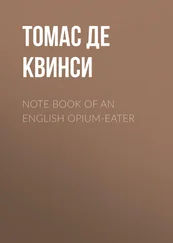Томас Де Квинси - Miscellaneous Essays
Здесь есть возможность читать онлайн «Томас Де Квинси - Miscellaneous Essays» — ознакомительный отрывок электронной книги совершенно бесплатно, а после прочтения отрывка купить полную версию. В некоторых случаях можно слушать аудио, скачать через торрент в формате fb2 и присутствует краткое содержание. Жанр: foreign_prose, literature_19, foreign_antique, на английском языке. Описание произведения, (предисловие) а так же отзывы посетителей доступны на портале библиотеки ЛибКат.
- Название:Miscellaneous Essays
- Автор:
- Жанр:
- Год:неизвестен
- ISBN:нет данных
- Рейтинг книги:3 / 5. Голосов: 1
-
Избранное:Добавить в избранное
- Отзывы:
-
Ваша оценка:
- 60
- 1
- 2
- 3
- 4
- 5
Miscellaneous Essays: краткое содержание, описание и аннотация
Предлагаем к чтению аннотацию, описание, краткое содержание или предисловие (зависит от того, что написал сам автор книги «Miscellaneous Essays»). Если вы не нашли необходимую информацию о книге — напишите в комментариях, мы постараемся отыскать её.
Miscellaneous Essays — читать онлайн ознакомительный отрывок
Ниже представлен текст книги, разбитый по страницам. Система сохранения места последней прочитанной страницы, позволяет с удобством читать онлайн бесплатно книгу «Miscellaneous Essays», без необходимости каждый раз заново искать на чём Вы остановились. Поставьте закладку, и сможете в любой момент перейти на страницу, на которой закончили чтение.
Интервал:
Закладка:
O, mighty poet! Thy works are not as those of other men, simply and merely great works of art; but are also like the phenomena of nature, like the sun and the sea, the stars and the flowers,—like frost and snow, rain and dew, hail-storm and thunder, which are to be studied with entire submission of our own faculties, and in the perfect faith that in them there can be no too much or too little, nothing useless or inert—but that, the further we press in our discoveries, the more we shall see proofs of design and self-supporting arrangement where the careless eye had seen nothing but accident!
ON MURDER,
CONSIDERED AS ONE OF THE FINE ARTS
SIR,—We have all heard of a Society for the Promotion of Vice, of the Hell-Fire Club, &c. At Brighton, I think it was, that a Society was formed for the Suppression of Virtue. That society was itself suppressed—but I am sorry to say that another exists in London, of a character still more atrocious. In tendency, it may be denominated a Society for the Encouragement of Murder; but, according to their own delicate [Greek: euphaemismos], it is styled—The Society of Connoisseurs in Murder. They profess to be curious in homicide; amateurs and dilettanti in the various modes of bloodshed; and, in short, Murder-Fanciers. Every fresh atrocity of that class, which the police annals of Europe bring up, they meet and criticise as they would a picture, statue, or other work of art. But I need not trouble myself with any attempt to describe the spirit of their proceedings, as you will collect that much better from one of the Monthly Lectures read before the society last year. This has fallen into my hands accidentally, in spite of all the vigilance exercised to keep their transactions from the public eye. The publication of it will alarm them; and my purpose is that it should. For I would much rather put them down quietly, by an appeal to public opinion through you, than by such an exposure of names as would follow an appeal to Bow Street; which last appeal, however, if this should fail, I must positively resort to. For it is scandalous that such things should go on in a Christian land. Even in a heathen land, the toleration of murder was felt by a Christian writer to be the most crying reproach of the public morals. This writer was Lactantius; and with his words, as singularly applicable to the present occasion, I shall conclude: "Quid tam horribile," says he, "tam tetrum, quam hominis trucidatio? Ideo severissimis legibus vita nostra munitur; ideo bella execrabilia sunt. Invenit tamen consuetudo quatenus homicidium sine bello ac sine legibus faciat: et hoc sibi voluptas quod scelus vindicavit. Quod si interesse homicidio sceleris conscientia est,—et eidem facinori spectator obstrictus est cui et admissor; ergo et in his gladiatorum cædibus non minus cruore profunditur qui spectat, quam ille qui facit: nec potest esse immunis à sanguine qui voluit effundi; aut videri non interfecisse, qui interfectori et favit et proemium postulavit." "Human life," says he, "is guarded by laws of the uttermost rigor, yet custom has devised a mode of evading them in behalf of murder; and the demands of taste (voluptas) are now become the same as those of abandoned guilt." Let the Society of Gentlemen Amateurs consider this; and let me call their especial attention to the last sentence, which is so weighty, that I shall attempt to convey it in English: "Now, if merely to be present at a murder fastens on a man the character of an accomplice; if barely to be a spectator involves us in one common guilt with the perpetrator; it follows of necessity, that, in these murders of the amphitheatre, the hand which inflicts the fatal blow is not more deeply imbrued in blood than his who sits and looks on: neither can he be clear of blood who has countenanced its shedding; nor that man seem other than a participator in murder who gives his applause to the murderer, and calls for prizes in his behalf." The " præmia postulavit " I have not yet heard charged upon the Gentlemen Amateurs of London, though undoubtedly their proceedings tend to that; but the " interfectori favil " is implied in the very title of this association, and expressed in every line of the lecture which I send you.
I am, &c. X. Y. Z.
GENTLEMEN,—I have had the honor to be appointed by your committee to the trying task of reading the Williams' Lecture on Murder, considered as one of the Fine Arts; a task which might be easy enough three or four centuries ago, when the art was little understood, and few great models had been exhibited; but in this age, when masterpieces of excellence have been executed by professional men, it must be evident, that in the style of criticism applied to them, the public will look for something of a corresponding improvement. Practice and theory must advance pari passu . People begin to see that something more goes to the composition of a fine murder than two blockheads to kill and be killed—a knife—a purse—and a dark lane. Design, gentlemen, grouping, light and shade, poetry, sentiment, are now deemed indispensable to attempts of this nature. Mr. Williams has exalted the ideal of murder to all of us; and to me, therefore, in particular, has deepened the arduousness of my task. Like Æschylus or Milton in poetry, like Michael Angelo in painting, he has carried his art to a point of colossal sublimity; and, as Mr. Wordsworth observes, has in a manner "created the taste by which he is to be enjoyed." To sketch the history of the art, and to examine its principles critically, now remains as a duty for the connoisseur, and for judges of quite another stamp from his Majesty's Judges of Assize.
Читать дальшеИнтервал:
Закладка:
Похожие книги на «Miscellaneous Essays»
Представляем Вашему вниманию похожие книги на «Miscellaneous Essays» списком для выбора. Мы отобрали схожую по названию и смыслу литературу в надежде предоставить читателям больше вариантов отыскать новые, интересные, ещё непрочитанные произведения.
Обсуждение, отзывы о книге «Miscellaneous Essays» и просто собственные мнения читателей. Оставьте ваши комментарии, напишите, что Вы думаете о произведении, его смысле или главных героях. Укажите что конкретно понравилось, а что нет, и почему Вы так считаете.












